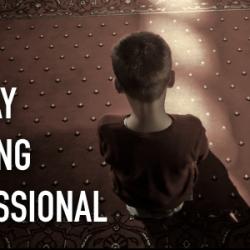The central confession of the Christian faith is: Jesus is Lord. We don’t really use the language of “lords” anymore, but the phrase just means the Christian is supposed to live in obedience to Christ, as though Christ were a lord, or ruler, or king. Jesus is the boss. Whatever he says, goes, even when it comes to things that are not explicitly religious. Christian attitudes and postures are meant to imitate Christ’s attitudes and postures.
So what would it look like to imitate the attitudes and postures of Jesus when it comes to the American immigration debate?
Jesus, Outsiders, and Foreigners
The Old Testament is full of commands directing God’s people to include immigrants as full participants in their communities. The exclusion or mistreatment of foreigners was strictly forbidden: “When a foreigner resides among you in your land, do not mistreat them. The foreigner residing among you must be treated as your native-born. Love the alien as yourself, for you were foreigners in Egypt,” (Lev. 19:33-34). The people of God were told to treat aliens equally under the law (Num. 15:15), and the oppression of immigrants was strictly forbidden: “You must not oppress a foreigner, since you know the life of a foreigner,” (Ex. 23:9).
With only a few exceptions, the Old Testament required hospitality and fair treatment toward foreigners and aliens for one simple reason: at some point, everybody is a stranger in need of help.
The stranger has special status in the story of God. A stranger is one who has had to disconnect themselves from relationships and places that used to offer safety and security, because those places have become dangerous and insecure. As the poet Warsan Shire says, “No one leaves home unless home is the mouth of a shark.”
Jesus was part of that old Hebraic story of hospitality. Perhaps this is part of why at any point the ancient world could be divided into insiders and outsiders — strangers and neighbors, natives and foreigners — Jesus would stand with the outsiders and say, “I’m with them. You counting me out, too?” When Jesus encountered someone who was being scapegoated or excluded, he would hammer the exclusionists. He would embarrass them, wail on them, and subvert their actions. If inclusion of the “other” required the alleviation of some deficiency, disease, deformity, or technicality, Jesus would find a way to overcome it even if it took a miracle.
If we take these actions and teachings of Jesus seriously, then a simple and unavoidable fact emerges: One of the central thematic gists of the New Testament involves the radical inclusion of many strange “others.”
Jesus constantly demanded the inclusion of those who were excluded from community on account of some dumb law: lepers, tax collectors, gentiles, soldiers, women, children, sinners, the unclean, and even foreigners such as Samaritans and Syrophoenicians were restored, included, and even celebrated as heroes.
In his first sermon (Luke 4), Jesus blasted the ethnic nationalism of his hometown. They literally ran him out of town and tried to kill him for it. Jesus taught that the path to God is to love God, and to love your neighbor. When they asked him to clarify what he meant by “neighbor,” Jesus told the story of the Good Samaritan, making the ethnically scapegoated “illegal alien” of his day the hero of his story. There’s your neighbor, he said.
Jesus made no distinction between the natural born citizen and the foreigner, and he always, always embraced the stranger. So, anyone who wants to follow Jesus must do the same.
In practical terms, this means that any Christian who embraces the mistreatment of immigrants does so in direct opposition to Christ. Any Christian who scapegoats the illegal alien rejects Christ. Any Christian who advocates the exclusion of the asylum seeker will find themselves excluded from God’s blessing, and from fellowship with Jesus.
These are hard words, but they are unavoidable. If you are a Christian who embraces Donald Trump’s hard line stance toward the immigrant, I’m telling you, Jesus does not have your back. Jesus confronts you—as I do—and accuses you of putting political ideology, fear, selfishness, or tribalism above the central requirement to embrace the stranger. Jesus taught his followers that to care for the strange “other” was to care for Christ. To reject the stranger, immigrant, alien, and asylum seeker is to reject Jesus, (see Matt. 25).
There’s simply no justification from the life and teachings of Jesus to exclude immigrants, scapegoat them, or refuse them hospitality for any reason.
Early Christians Followed Suit
Jesus’s approach took root in the imagination of his followers. The apostle Paul repeatedly checked attempts to use nation, status, gender, or ethnicity to divide: “There is neither Jew nor Gentile, neither slave nor free, nor is there male and female, for you are all one in Christ Jesus.” (Gal. 3:28) You can tell where people follow Jesus, because “there is no Gentile or Jew, circumcised or uncircumcised, barbarian, Scythian, slave or free, but Christ is all, and is in all.” (Col. 3:11). Paul railed against ethnic or nationalist divisions, “For there is no difference between Jew and Gentile.” (Rom. 10:12) He blasted divisions around citizenship because, “You are no longer foreigners and strangers, but fellow citizens with God’s people…” (Eph. 2:19) Paul even brought foreigners into the Jewish area of the temple and then was arrested for it (Acts 21).
Paul was not alone. Philip and the Ethiopian eunuch and Peter’s encounter with Cornelius both stand as scandalous examples of the radical hospitality toward foreigners practiced by early Christians.
Jesus consistently rejected and ignored exclusionary ethnic, legal, and cultural norms. Early Christians followed suit, practicing radical hospitality toward aliens, and foreigners. The inclusion of those who had previously been excluded from community by the law is an unmistakable, persistent, and central theme in the New Testament.
Crossing a Line, Breaking a Law
There is one New Testament story that I think directly informs the Christian approach to illegal immigrants in particular: the woman with a flow of blood (Mark 5:25-34).
An unnamed woman had been hemorrhaging for twelve years. According to Jewish law, her condition rendered her unclean, locked out of the life of the people of God. The laws were strict. Anyone who came in contact with her would be contaminated. She had to avoid contact with others, especially priests or rabbis. She couldn’t touch another person’s clothing. She couldn’t go to the temple, or worship in the synagogue. She couldn’t bathe in the pools, or share a meal with her family. She couldn’t hug her own children (if she had them), and if she couldn’t have children because of her condition, she could be divorced.
The woman with a flow of blood was locked on the other side of an invisible border.
For twelve years she lived in sorrow and constant danger. She consulted every expert. She spent her entire fortune attempting to find her way back into the community, but no legal pathway was open to her.
Then Jesus came to town, and the woman pushed her way into a crowd of people, rubbing shoulders with the insiders (her first act of breaking the law). Then, in an act of total desperation she touched the hem of Jesus’s garment (breaking the law again). There’s no wiggle-room here. The woman crossed a line she wasn’t supposed to cross. She didn’t follow procedure. She was desperate and broke the law. She illegally crossed the border between clean and unclean. She reached out to touch the rabbi’s garment in the hope that she might be healed and included in the blessings of community.
Immediately, Jesus sensed a powerful engagement had taken place. “Who touched me?” he asked.
“You’re joking, right?” his disciples said. “You see this crowd pressing in on you?”
“No, somebody touched me in faith. Somebody reached for help.”
Finally, scared half to death, the woman came out of the shadows and confessed herself a dreamer. She told Jesus the details of her situation, how the laws had pushed her to the margins, and locked her out of the blessings of community. She had consulted the experts and spent every penny hoping to be accepted, but nothing worked. So, in desperation, she broke the law, hoping to be healed and embraced by the blessed people. She begged Jesus for amnesty.
Jesus’s response is clear: He affirmed her actions, calling them an act of faith. Think about that. Christ called her unlawful action an act of faith. “Your faith in me was well founded. Here are your papers. You are one of us now. Go in peace.”
Who Would Jesus Deport?
The modern “illegal immigrant” and asylum seeker has much in common with the woman with a flow of blood. Facing a desperate situation, these people long to be part of a flourishing community. They spend years languishing on the margins, locked out of the good life. They consult experts. They spend their fortune. Finally, they risk everything and cross a line they are not supposed to cross. They beg for inclusion in a blessed society. They break a law and reach out to touch the garment’s hem. They come to my neighborhood (I’m literally watching their children play in the yard across the street from my office).
How would Jesus greet these undocumented immigrants and asylum seekers? Would he ask to see their papers? Would he break down their door and initiate deportation proceedings? I think not.
My faith tells me Jesus would embrace the undocumented immigrant just as he embraced the woman with the flow of blood. He would call their minor transgression an act of faith, restore them, and invite them to participate fully in our community. But don’t take my word for it. We have Jesus’s own words to consult: “Come to me, all you who are weary and heavy laden, and I will give you rest.” (Mt. 11) Or, “I was a stranger and you welcomed me … for whenever you did it for the least of these brothers and sisters, you did it for me.” (Mt. 25) I could go on and on with texts and stories like these. Jesus was never down with counting people out.
Would Jesus Break the Law?
What is often lost among Christians in the conversation about immigration, is the fact that our primary belonging and allegiance is with the church, not the state. Our confession is that although nations and states have borders the church does not. Our posture toward the immigrant—especially the undocumented—is governed not by the laws of the land, but by the gospel. The immigration debate is one of those times when our citizenship in the kingdom of heaven is tested against our U.S. citizenship.
The posture of hospitality required by our faith and participation in the Church must supersede the posture of exclusion taken by any group or nation. Jesus would never look the other way when faced with the separation of families or mistreatment of prisoners. So we must not look the other way either. Jesus always resisted the scapegoating of immigrants and ethnic groups, so we must resist this as well. Jesus embraced the foreigner. Therefore we must embrace the foreigner, too. Jesus used his power to ensure the inclusion of the outsiders. The church must use its power to lift up the vulnerable outsiders, too.
Would Jesus break the law? Would he grant amnesty to those undocumented immigrants already among us? Would he give them papers, and make them citizens? I don’t see any way around it. Jesus overcame every hurdle and every law that kept people out of full participation in his community back then. Why would he act differently today? Maybe the better question is, why do the people who claim to live in his name refuse to follow his example?
Some will say, “No, Jesus would follow the laws or change them.” But that’s not quite right. Jesus and his followers often worked outside the laws, subverting unjust laws through love and hospitality. Jesus violated unjust laws. I mean, they didn’t kill him for defending the status quo. I have no trouble imagining Jesus miraculously producing visas the way Peter miraculously produced tax money from the mouth of a fish.
What’s more, today’s Christians don’t even need a miracle. We have political power. If every confessing Christian raised their voice to demand the government cease their mistreatment of refugees, to demand the immigrant’s full inclusion in society, to put the undocumented among us on a path to citizenship, then it would soon happen, and our society would become just a little more virtuous.
Shouldn’t Christians Follow the Laws?
Governmental laws and policies often conflict with the teachings of Jesus. That’s not surprising. What is surprising, is how many of the same people who rail against the government’s intrusion on religious liberties — the ones who fight and sue and lobby and even disobey the government on many other issues — are suddenly overcome by paralysis when it comes to immigration. It’s such a pronounced dichotomy that I cannot help but wonder if racism, politics or greed must be at the heart of it. Christians disingenuously hide behind unjust immigration laws. Pretending their hands are tied they exclaim, “What can we do?” The obvious answer is to do what you do in the case of other laws you oppose: advocate for change.
Christians who mobilize to defend the rights of the unborn, but keep silent about the rights of aliens out of respect for “the law” are being plainly duplicitous.
Some will ask, “Doesn’t Romans 13 require us to follow the law?” There are glaring problems with this approach. First, America was founded by Christians who were ignoring and protesting unjust laws. By that logic the Boston Tea Party, the Declaration of Independence, and the American Revolution would be rejected. Second, the people of God have a long history of refusing to comply with laws that violate the teachings of Jesus. The abolitionist movement and the underground railroad were both led by Christians who were violating the law.
Third, we must read Romans 13 alongside Romans 12. Paul’s command was given under the assumption that the government would eventually show up to persecute those who follow Jesus in outrageous displays of love. The Christians are the ones who “do not conform to the pattern of this world,” (12:2) precisely because they “extend hospitality to strangers,” (12:13). Hence, those who follow Jesus can expect to run afoul of the authorities, and will have to submit to their retribution (Rom.13).
In short, Christians are never allowed to use submission to the law — or Romans 13 for that matter — as an excuse to disobey Jesus.
It is true that undocumented immigrants have broken the law. But I would relate this to getting caught speeding while rushing a sick person to the hospital. You don’t jail someone for that. You find a way to offer them hospitality. Like the woman with a flow of blood who broke the law, these immigrants reach out in desperation to be included in the blessings of God’s favor. How can we reject them by silently watching as the government tears apart their families, jails, and mistreats them? To watch this happen and feign powerlessness and hiding behind our obedience to the law is a rejection of Christ’s teaching.
From time to time, following Christ will put us at odds with the government. Welcoming immigrants may be a strain on our towns and cities, and it may require personal sacrifice. But Jesus’s most characteristic call to his followers was, “Take up your cross and follow me.” This was not an invitation to pain-free living. Christians are meant to subvert unjust laws through the radical inclusion of the outsider, just as Jesus did time and time again. We show hospitality to the vulnerable, even if it means breaking the law. As Dr. King said, “One has a moral responsibility to disobey unjust laws.” Immigration law in America is unjust. Christians should subvert it, and work to change it.
Aren’t Their Pragmatic Limitations?
Often I am accused of “being for open borders.” I am asked, “Do you think we should throw open the borders and let everybody in?” Again, how I feel isn’t the point. How would Jesus approach this question?
I think we can say that God is not opposed to boundaries and borders. Many good things have some kind of border, like your skin or bodily organs, or like our homes, neighborhoods, and school districts. However, problems arise when those borders are not porous. Healthy borders are porous, allowing a healthy exchange of all things necessary for flourishing on both sides, (think of the difference between a breathable versus a non-breathable raincoat). Borders that do not allow a healthy exchange will eventually kill the very thing they are meant to protect.
Why is there not a healthy exchange at the U.S. border with Mexico?
This is a complicated question. There are cultural issues, issues of sin and brokenness, issues of racism, xenophobia, and scapegoating. There are complicated political and foreign policy questions in play. Sadly, the immigration debate in our society has mostly become a boundary marker for American political tribalism. The inability to create a healthy, porous southern border is an indictment of the immaturity of U.S. society as a whole.
Of course there are limits to the number of immigrants any society can welcome at any given time without becoming overwhelmed. However, pragmatic concerns do not release Christians from our obligation to Christ, and to the radical inclusion of many strange others.
While acknowledging our society’s limited capacity, Christians must never agree to scapegoating immigrants and asylum seekers. Christians must distance themselves from politicians who exploit the vulnerable in order to win votes. Christians cannot indulge our fear of cultural change or racial diversity. Christians must never wonder if welcoming the immigrant might cost them some political power.
One of the gifts that the people of God can give to the world is our ability to see the world truthfully. That means Christians should have no trouble recognizing the role American foreign policy plays in driving immigration and asylum seeking. The U.S. has destabilized many a Central American government over the years, and installed many a corrupt leader. American corporations engage in predatory capitalism and unethical treatment of workers in Mexico and many Central American countries, purchasing the government’s silence. It is disingenuous to cast all the blame on the people who are fleeing from the very governments that America’s leaders have disrupted for generations.
The U.S. has helped to create many of the problems from which Mexican and Central American refugees are fleeing. U.S. foreign policy often undermines the safety and security of communities outside our borders. That means this country has an obligation to offer assistance to those who show up at our borders asking for help. It also means offering aid to Central American nations themselves. Foreign aid is absolutely crucial to our ability to stem the tide of refugees and asylum seekers. Christians should oppose the recent cuts in foreign aid to Central America, and advocate for a more just approach to the region.
Long term, the only way to create a more healthy, porous exchange at the southern border, while ensuring that our society is not swamped by refugees, is to treat those who have come to us fairly and humanely, and to work to improve the desperate conditions in the countries from which they’ve come.
What Can Christians Do / Not Do On Immigration?
Christians can do many things as an expression of our faith in Christ. We can:
- Get involved personally with immigrants in our communities.
- Acknowledge the racism imbedded in our culture and its role in the mistreatment of immigrants.
- Confess the racism that lives in our own hearts, and repent.
- Oppose the mistreatment of asylum seekers at the border, and undocumented immigrants in our own communities.
- Disentangle ourselves from U.S. political tribalism.
- Advocate for better and more just security at the border.
- Advocate for an increase in legal immigration quotas.
- Advocate for a path to citizenship for undocumented immigrants among us.
- Support efforts to end drug and sex trade across the border.
- Do more to curb drug abuse in our own country.
- Ask the State Department to work with Central American nations to improve conditions in those countries.
- Demand increases in foreign aid, economic partnerships, and efforts to help struggling Central American nations improve.
We can do all of those things, and we can do them in the name of Christ. What we cannot do in the name of Christ is:
- Call the immigrant and asylum seeker a dangerous invader, an outsider who should go home and suffer quietly.
- Stand silently while the government separates families and locks children in cages.
- Support politicians who scapegoat or abuse immigrants and asylum seekers.
- Silently disengage and let events play out.
- Blame immigrants for our own complex problems and cultural changes.
- Feign powerlessness and hide behind the laws while dehumanizing policies ravage the lives of the vulnerable on our borders.
- Live in fear of cultural change and racial diversity.
- Ignore the clear New Testament call to radical hospitality.
In short, Christians cannot refuse to show basic hospitality to all kinds of strange others. We cannot refuse to help to the least of these, unless we want to refuse Christ. We must remember that Christ’s harshest rebuke was reserved for those who mistreated the vulnerable. “If you did not do it for the least of these, you did not do it for me… go away to eternal punishment.” (Mt. 25).
Please follow me on Twitter: @Tim_Suttle


















